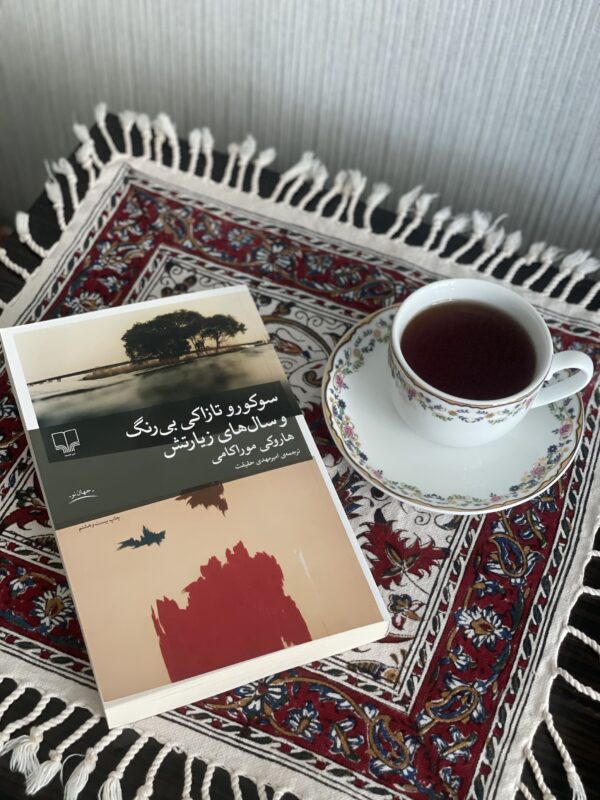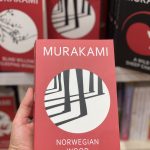
" Colorless Tsukuru Tazaki and His Years of Pilgrimage (Part One) "
The story of how I came to read this novel is interesting as well. In one of Shahin Kalantari’s webinars, the topic of Haruki Murakami and his captivating world came up. Shahin Kalantari introduced this book from among Murakami’s works, and I hadn’t heard of it before. I asked about it at the information desk of Kinokuniya Bookstore in Dubai Mall. They said that no orders had been placed to stock the book since 2017, and it was currently unavailable. It was surprising to me that, despite the global popularity of Murakami’s works, this particular book hasn’t been available in recent years at such a prominent and large bookstore.
A little later, in Tehran, I was having coffee at a café on Vali-Asr Street when the café’s bookshelf caught my attention. I reached out and pulled out “Colorless Tsukuru Tazaki” from among the books. I read a few pages. However, I didn’t have the time or patience to continue the book to the end.
That night, I talked to my cousin Zainab, with whom I share a common interest in animation, anime, Japanese culture, Murakami, and Miyazaki, about Tsukuru. The following week, when I saw Zainab again, she had a gift for me: the book “Colorless Tsukuru Tazaki and His Years of Pilgrimage” along with an action figure of Hermione from Harry Potter. I was so excited that I couldn’t wait to get back to Dubai to start reading the book.
Every time I held the book to read, the scent of the paper intoxicated me. Sometimes, I couldn’t bear to read quickly; I was afraid it would end too soon, leaving me with nothing but an empty world, a world empty of story.
“But these thoughts lead nowhere. The human heart is like a moth. It silently waits for something, and when the time comes, it flies straight towards it.”
But my heart doesn’t wait so silently. It always beats rapidly, as if my chest is too tight for it. It’s always ready and poised, waiting for a crack through which it can leap and fly, seeking freedom. Sometimes, your abilities, talents, and even your name can feel heavy and be shackles on your hands and feet. Everything that is light and effortless draws my heart towards it.
“But what did this exceptional genius mean for Midorikawa? Was having a genius like Midorikawa’s an astonishing blessing or a burden? A gift or a curse? Or perhaps all of these at once? In any case, Midorikawa didn’t seem like a particularly happy person. His expression oscillated between sadness and indifference.”
“Your father felt that the word ‘create’ might become a burden on your shoulders. A simpler name, ‘Tsukuru,’ was easier to pronounce and he thought it was a more casual and relaxed name.”
That’s when you wish you felt this way:
“I am clinging to this world like an insect shell stuck to a piece of twig, on the brink of being blown away forever by a strong wind.”
Sara said, “There’s still something stuck inside you. Something you can’t accept is blocking the natural flow of your emotions. That’s how I feel about you.”
She’s right. There’s something stuck inside me too. Whenever something gets stuck, I become locked, powerless, and unable to enjoy life and pleasure. Sometimes, it’s even myself who gets stuck—in a memory, a moment, a place, or a feeling.
“Some things in life are so complicated that they cannot be explained in any language.
Tsukuru thought that Olga was completely right. Not only is it impossible to explain them to others, but also to yourself. If you force yourself to explain, you end up giving a bunch of lies.”
Not everything should always be put into words and sentences. Sometimes, silence is the loudest cry, and instrumental music can express the essence of a message in the most eloquent way. Although I doubt that this inadequacy of language is always due to the complexity of the subject. Sometimes, even the simplest concepts have no place in words.
سوکورو تازاکی بیرنگ و سالهای زیارتش (بخش اول)
قصهی خواندن این رمان هم جالب است. در یکی از وبینارهای شاهین کلانتری، حرف موراکامی و جهان دوستداشتنیاش شد. شاهین کلانتری از میان کارهای او، این کتاب را معرفی کرد. اسمش را نشنیدهبودم. سراغش را از مسئول اطلاعات فروشگاه کتاب کینوکونیای دبیمال گرفتم. گفتند از سال 2017 دیگر سفارشی برای موجود کردن این کتاب ثبت نشده و درحالحاضر موجود نداریم. برایم عجیب است که باوجود محبوبیت جهانیِ کارهای موراکامی، چرا نباید این کتابش در سالهای اخیر در چنین کتابفروشی مطرح و بزرگی موجود باشد.
اندکی بعد، در تهران، در کافهای در خیابان ولیعصر، مشغول نوشیدن قهوهام بودم که قفسهی کتابهای کافه توجهم را جلب کرد. دست بردم و سوکورو تازاکی را از لابهلای کتابها بیرون آوردم. چند صفحهای خواندم. مجال و البته حوصله برای ادامهی کتاب تا پایان نبود.
شب، با زینب، دختر عمهام، که سلیقه مشترکی در علاقه به انیمیشن و انیمه، فرهنگ ژاپنی، موراکامی و میازاکی داریم، از سوکورو حرف زدم. هفتهی بعد که دوباره زینب را دیدم برایم هدیهای آوردهبود. کتاب «سوکورو تازاکی بیرنگ و سالهای زیارتش» به همراه یک اکشن فیگور از شخصیت هرمیون در هریپاتر. بهقدری ذوق کردم که طاقت نداشتم برسم دبی برای خواندن کتاب.
تمام مدّتی که کتاب را برای خواندن دست میگرفتم، بوی کاغذ مستم میکرد. گاهی دلم نمیآمد تندتند بخوانم، میترسیدم زود تمام شود و من بمانم و یک دنیای خالی، دنیای خالی از داستان.
“ولی این فکرها به هیچجا نمیرساندش. قلب آدمیزاد مثل شبپره است. بیصدا منتظر چیزی میماند و وقتش که شد یک راست به سویش میپرد.”
اما قلب من همچین هم بیصدا منتظر نمیماند. همیشه تندتند میتپد، انگار قفسهی سینهام برایش تنگ باشد. همیشه آماده و دورخیزکنان منتظر روزنهای است برای جهیدن و پریدن، برای رهایی. گاهی تواناییها، استعدادها و حتا نامت هم برایت سنگینی میکنند و بندی هستند به دست و پایت. هرچیز آسوده و بیوزنی قلبم را بهسوی خود میکشاند.
“ولی این نبوغ استثنائی برای شخص میدوریکاوا چه معنایی داشت؟ آیا داشتن نبوغی مثل نبوغ میدوریکاوا، سعادتی شگفتانگیز بود یا باری بر دوش؟ موهبت یا آفت؟ یا همزمان همه اینها؟ درهرحال، میدوریکاوا ظاهرن آدم چندان خوشحالی نبود. حالت قیافهاش میان غم و بیتفاوتی در نوسان بود.”
“پدرت احساس میکرد که حرف «آفریدن» ممکن است باری روی دوشت بشود. حرف سادهتر هم «سوکورو» خوندهمیشد و او فکر کرد اسم بیقیدتر و راحتتری است.”
آنوقت است که دلت میخواهد چنین حسی داشتی:
“به این دنیا چسبیدهام مثل پوستهی حشرهای که به تکّه شاخهای چسبیدهباشد، در آستانهی اینکه با تندبادی برای همیشه بر باد برود.”
“سارا گفت: “هنوز یک چیزی توی تو گیر کرده. یک چیزی که نمیتوانی قبولش کنی، جلوی جریان طبیعی احساساتت را گرفته. من یک همچین حسی دربارهات دارم.””
راست میگوید. در من هم چیزی گیر میکند. هروقت چیزی گیر کند قفل میشوم؛ ناتوان میشوم، از زندگی و لذّت بردن. گاهی اوقات هم این خودم هستم که گیر میکنم؛ در یک خاطره، یک زمان، یک مکان و یا یک حال.
“بعضی چیزها توی زندگی آنقدر پیچیدهاند که به هیچ زبانی نمیشود توضیحشان داد.
سوکورو فکر کرد که اولگا کاملن راست میگوید. نه فقط نمیشود به بقیه توضیح بدهی، که به خودت هم نمیشود. اگر خودت را مجبور کنی به توضیح دادن یک مشت دروغ تحویل میدهی.”
همیشه که نباید همه چیز را در تن واژه و جمله کرد. گاهی سکوت بلندترین فریاد است و گاه یک موسیقی بیکلام جان کلام را بهشیواترین شیوه بیان میکند. هرچند شک دارم که این ناتوانی زبان، همیشه از پیچیدگی موضوع باشد. گاهی حتا سادهترین مفاهیم هم جایی در کلمات ندارند.



